Blessed are those who mourn: parish volunteers give solace to the brokenhearted
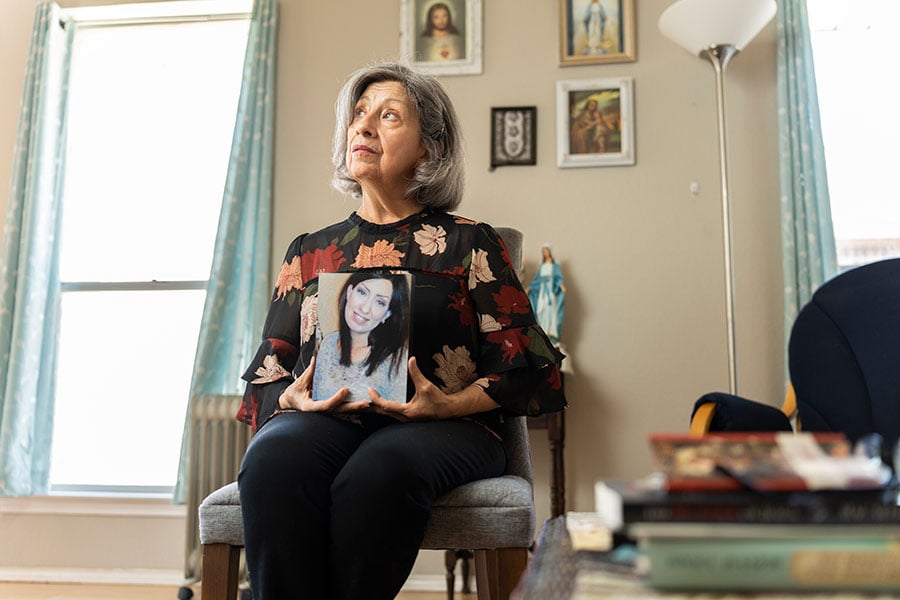
Photo illustration by Juan Guajardo
Losing a daughter and, weeks later, a sister in 2020 devastated Estella McKanna. The isolation, caused by a global pandemic, only compounded her grief.
“Everything was closed — including the churches — so there was no one to turn to. I couldn’t find the help I needed,” remembered the parishioner of St. Peter the Apostle Church in Fort Worth. “I had family support, but they couldn’t stand to see me cry. I couldn’t talk about what was going on inside me.”
She’d vent her grief at the only place open to the public — the cemetery.
Comfort came in late fall 2020 after finding a bereavement support group offered at St. Thomas the Apostle Parish in Fort Worth.
“In the group, I was listening to others and didn’t feel so alone,” the grieving mother explained. “Sometimes when you’re hurting, you forget others are in pain and suffering too.”
Reaching out to people grieving the loss of a loved one is a ministry of consolation. After the death of Lazarus, even Jesus mourned and supported the dead man’s family in their grief (John 11:33-36).
Today more parishes are responding to the promise of the Beatitude, “Blessed are those who mourn for they will be comforted,” by offering a bereavement ministry. Grief is a universal emotion that affects everyone at some point, and the work needed to heal a broken heart requires time, effort, tears, and compassion. A support group is a safe, nonjudgmental place where participants can share their loss and let feelings flow.
“You need to put that grief into words, and talking about what you went through might help someone else,” said McKanna, who experienced enough healing to help start a grief ministry in her own parish. Guided by different facilitators, the St. Peter’s group meets on the first Saturday of the month.
In today’s world, people are very attached to electronics such as smart phones and iPads, “but those devices aren’t going to get you through the hard times, and neither will the medications doctors are willing to dispense,” she pointed out. “You need a group like this where people can get the help they need to go on in life. There are people who are hurting out there. I don’t want them to feel there’s nowhere to go like I did.”
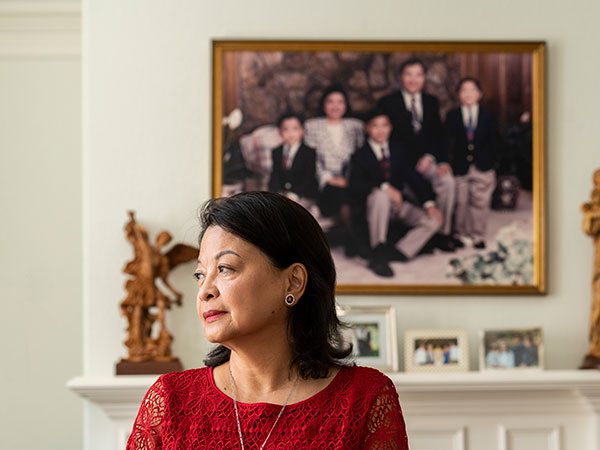
Walking with the Mourner
Dr. Maria Moneta de Castro uses her medical knowledge and time spent studying at the Center for Loss and Life Transition in Colorado to serve the grief ministry programs at St. Peter and Holy Family in Fort Worth, her home parish. The seminars she attends were developed by Alan Wolfelt, the bestselling author of several books on death including Understanding Your Grief, a guide used by many counselors.
A retired pediatrician who lost her husband 14 years ago in a motorcycle accident, de Castro still experiences bursts of grief and uses what she’s learned to help others navigate loss.
“I’ve learned that you don’t solve their grief. You walk with the mourner,” she said, repeating the wisdom gleaned from workshops. “You accompany them on the journey.”
De Castro remembers being in shock for weeks after the sudden death of her healthy, 53-year-old spouse on a Sunday afternoon. Family and friends rushed to her side during the wake and funeral.
“But people get busy and after the first few weeks nobody calls you. I learned from that,” she continued. “So I don’t send a sympathy card right away. I do it later, and I do that with visits too.”
The bereavement support sessions she facilitates with other volunteers offer presence and prayer to help participants cope with the tsunami of emotions they are feeling. Grief is a personal journey, but sharing and listening to others helps.
“After my loss, I felt the pain would always be with me, but I learned how to live with it,” she affirmed. “It’s never completely gone because you loved, you have that pain. The deeper the love, the deeper the pain.”
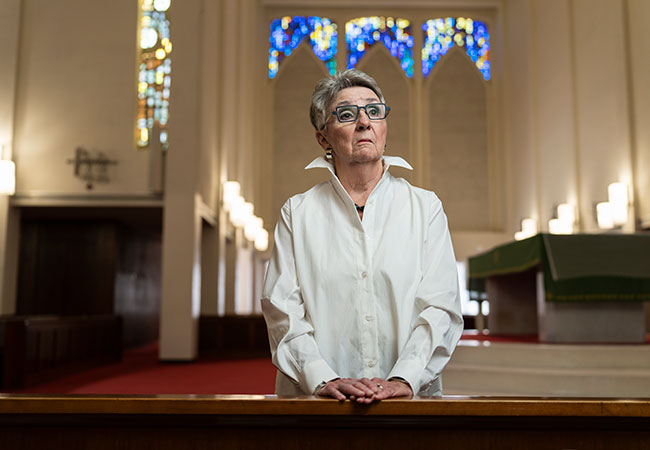
To Love is to Grieve
After 20 years spent guiding teens through the loss of a parent, sibling, or close friend at The Warm Place, the one thing Shirley Wells knows is “to love is to grieve.” The former volunteer at the Fort Worth nonprofit also understands from personal experience that bottling up emotions following a death can cause lasting anxiety, anger, and stress.
As a 19-year-old college student, her father’s sudden fatal heart attack and pressure to help with his funeral arrangements led to a crippling fear that lasted 25 years. Relief came after sharing her story during a training workshop.
“After my father died, I couldn’t talk about it with anyone because you didn’t talk about death back then, and it became a fear,” explained Wells, a grief ministry facilitator at Holy Family. “When the event happens, it’s important not to stuff feelings away because they will come back to haunt you in some way.”
Unresolved grief can lead to lasting depression, substance abuse, or other destructive behaviors.
“If you hold it in, you don’t heal. Talking about it begins the healing process, and that’s what these bereavement groups do,” Wells assured. “They walk with the person on their grief journey.”
One of four grief ministry volunteers at Holy Family, she always welcomes people to the parish’s monthly group meetings by telling her own story.
“When they know what we’ve been through it helps them,” she reiterated. “But there’s never total closure. If you loved that person, you grieve that person.”
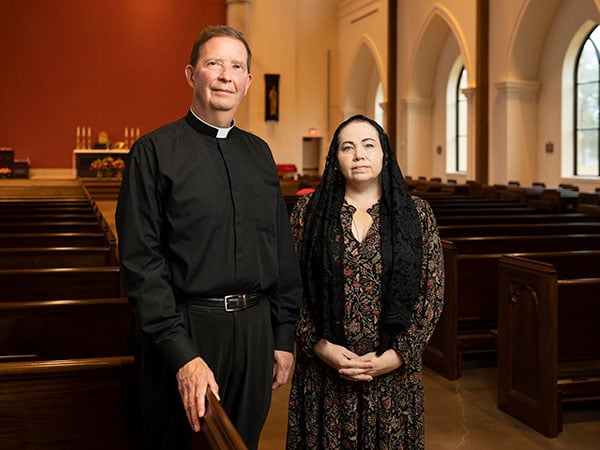
Grieving with Great Hope
Encouraging the grief-stricken as they navigate the emotional bridge to a new life is the focus of the Grieving with Great Hope ministry at St. Philip the Apostle Parish in Flower Mound. Started six years ago at the request of the pastor, Father Ray McDaniel, the five-week course is held each spring and fall and provides grief recovery support from a Catholic perspective.
Why is it important to have a grief ministry for parishioners? Because it gives them comfort, consolation, and lets people know God is with them,” explained Denise Koch, who served as director of the ministry for three years.
Sometimes the grief-stricken, struggling with loss, blame God.
“I want people to understand that God never abandons you. Everything happens according to His providence,” she added.
“This ministry gave me the opportunity not only to love and console people, but also to evangelize them on the teachings of the Church in a pastoral way.”
She recently led the discussion for a group of six women coping with the death of their fathers.
“They shared their stories, brought comfort to one another, and saw God at work in their suffering,” Koch recalled. “Each person in that group said it changed their lives and are now in a place where they can accept their grief.”
The Grieving with Great Hope course ends with a candlelight ceremony in the church with a priest or deacon sharing their thoughts about life after loss.
“It’s really beautiful because it allows people to truly mourn and grieve in a very intimate setting,” she explained.
Remembering the Unborn
The death of an unborn child is a loss that’s often not acknowledged.
“People gather around you when it is someone they could see, but no one saw this child,” said Pat Pelletier, president of Mother and Unborn Baby Care. “Closure is very difficult without a funeral.”
That’s why the dedicated pro-life advocate and her late husband, Chuck Pelletier, began hosting the Annual Memorial Mass for Children Who Died Before Baptism every fall more than 30 years ago. The liturgy, which includes families placing a rose on the Marian altar in memory of their children, helps begin the healing process for parents after a miscarriage, stillbirth, or abortion. It’s a spiritual, symbolic way of giving the child back to God and the Blessed Mother.
“What this Mass provides, in a sense, is a funeral and gravesite where they can put that rose,” said Pelletier thoughtfully.
“Many will think of that baby every time they go into a church and see a Marian altar. They know the child is at peace, so now they can be at peace.”
Every person who comes to the Mass has a story that brought them there.
“We lost our little baby almost five years ago, but she is still dear to us and gives us another reason to long for our heavenly home,” wrote one St. Maria Goretti parishioner. “Thank you for giving us a sacred time and place to mourn and remember.”
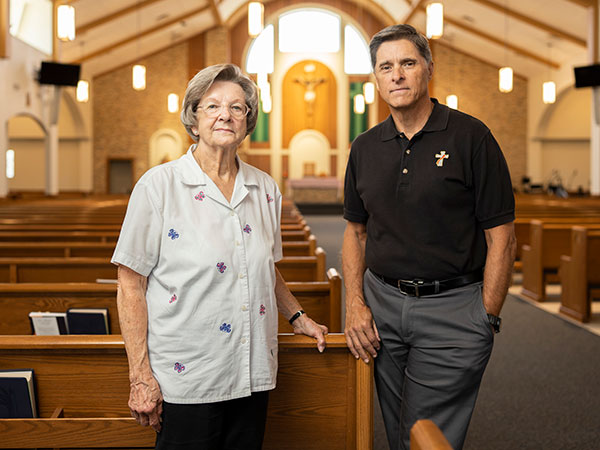
Honoring the Dead
Deacon Mike Handler lost count of the many funeral liturgies he’s presided at since being ordained to the diaconate in 2020.
“If I’m asked to give the homily, I always strive to offer some hope to the family suffering a significant loss in their lives,” said the deacon assigned to St. Thomas the Apostle Parish. “But that is only the beginning.”
After the funeral, mourners — especially spouses — are left with a significant void in their life as they return to a home that is now different. Sometimes family and friends will provide the support needed as a person moves through the emotional stages of grief.
“But when that’s not enough, the bereavement ministry is there to help,” Dcn. Handler continued. “This ministry does not offer professional counseling services, rather, it’s a ministry of presence and hope to the one grieving.”
Helen Mahan and Dee Martinez manage the monthly meetings and assist parishioners planning a funeral service at St. Thomas the Apostle Church. Ministry volunteers never give advice. They listen.
“Everybody on the bereavement team has lost someone, so we just share our stories and offer support,” Mahan said. “We always give our phone numbers to the people we are dealing with in case they have a bad day. We want to be available to them.”
During November, the ministry sets up a table in the vestibule of the church with photographs of parishioners who died during the year.
“We want people to remember those lost as well as their own loved ones,” she added. “It’s a way to honor our dead and pray for the souls in purgatory.”
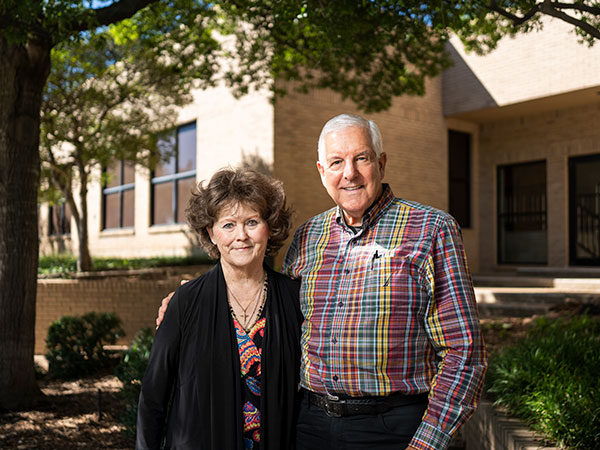
Healing the Brokenhearted
In her 1969 book On Death and Dying, psychiatrist and researcher Elisabeth Kübler-Ross identifies the five stages of grief as denial, anger, bargaining, depression, and acceptance. But there’s also a sixth step to recovery, asserted Bill Brewer.
“It’s when you can move forward on your own a little bit and give back,” explained the St. Frances Cabrini parishioner. “We see people wanting to help others because they know how hard it was.”
Brewer spent a year in denial after losing his first wife to a sudden bout of bacterial pneumonia at age 49. Reeling from the unexpected death, he moved to Granbury from Minnesota and joined the bereavement group at his new parish.
That’s where he met the woman he would eventually marry. Phillis Brewer, a widow, was leading the recently launched Starting a New Life ministry at St. Frances Cabrini. For the past 25 years, the couple has jointly managed the grief ministry classes at their parish as well as helping other churches develop their own programs.
“Grief is a roller coaster. You could be laughing one minute and crying the next, but you are not crazy,” Phillis said, repeating the insight she shares with newcomers. “I want to assure people that life will be different, but it can be good, joyful, and productive. You can move forward.”
Different topics dealing with a variety of issues like stress and loneliness are introduced at each meeting of the 10-week sessions, which are held in the spring and fall.
According to the organizers, the first gathering is always sad.
“All they know is they’re hurting and don’t want to be there, but they know they need help,” Bill Brewer observed. “By the 10th week I have to ring a bell to get them to quiet down. There is more ministry between participants than anything we do.”
The Brewers end each class with a prayer for healing and keep God a focal part of the program. People who came to the classes traumatized by loss begin to make strides toward a new but different life.
“That’s what we have seen for 25 years,” he said. “We see the Lord healing the brokenhearted.”
